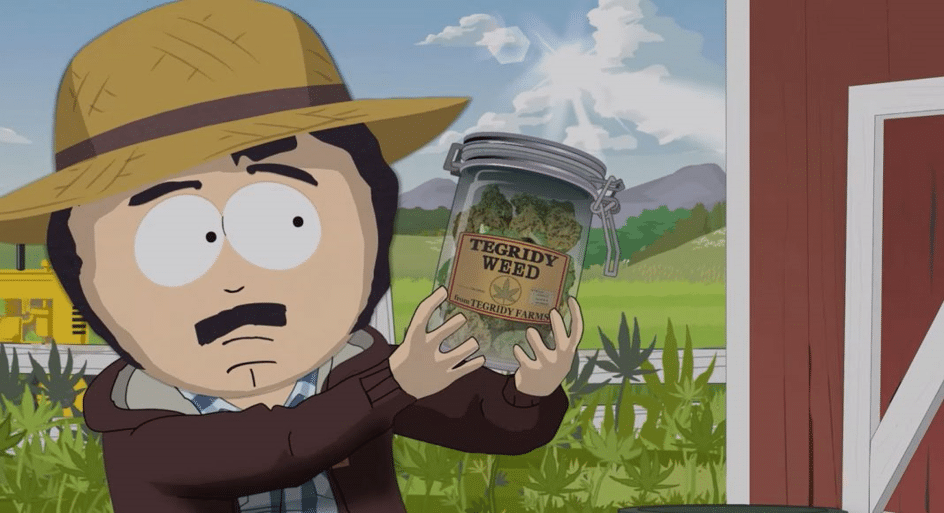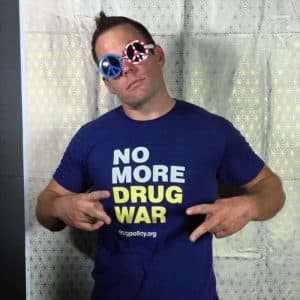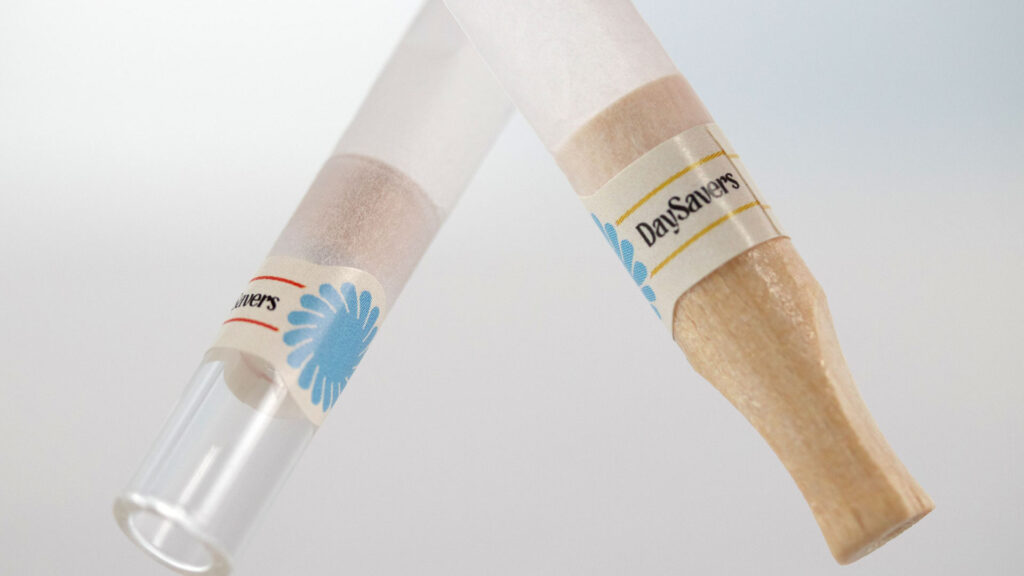Over the years, South Park has become an institution, an unbiased referee that many people look to for sober, 360-degree judgement on various topics comprising the modern cultural landscape. It’s like a wacky magnifying glass, exposing the absurdities in society and hyperbolizing them to hilarious proportions.
So, considering how much of the series’ ongoing 23rd season discusses cannabis and the issues surrounding it, and that South Park is a fictional town in Colorado, it’s intriguing to get a third-party opinion from the show’s creators Trey Parker and Matt Stone.
Randy Marsh – The Old-School Farmer
For those unfamiliar with Randy Marsh, one of the lead character’s dad, he’s the type of guy to act like a professional fighter after a single MMA practice or like hardcore activist after a Facebook post in support of a cause – a trait that makes him the perfect vehicle for South Park’s cannabis-related unforgiving satire.
With his newly found cannabis cultivator persona as the owner of Tegridy Farms (“tegridy” being “integrity,” pronounced the way an old-school farmer might), Randy is the embodiment of a phony farmer who pretends to have always been a passionate cannabis advocate, before it was cool, or profitable. Throughout the season, we keep hearing about the importance of “tegridy” to cannabis, except when it turns out to be a roadblock to Randy’s lofty business goals.
Tegridy Weed Commercials
Gimmicky, banal cannabis commercials for Tegridy Farms tick all the boxes – old-school craftsmanship; care for community and people; purity; transparency; organic, locally grown produce that has been carefully, methodically overseen; the joy of simple things; and above all else, “tegridy” – the magic ingredient that makes everything else come together, the source of unwavering reliability.
The fictional commercials are pure parody gold. Set against a signature acoustic guitar backdrop that conjures up country life, Randy’s thoughtful voice, suddenly a few octaves lower and deeper for some reason, narrates the meaning of tegridy.
“Tegridy Weed is about community. It’s a sunrise. It’s the smile on a baby. But most of all, Tegridy Weed is about family,” Randy explains as he takes the classic stance cowboys take when they’re either hitting on women or giving a life lesson, one leg lifted on a chair. “Making marijuana that’s simple. Marijuana that’s Tegridy. Because when you do the right thing, good things happen.”
Marijuana-Free Christmas Snow
Backstory: alcohol is banned in South Park for the duration of Christmas, breaking everyone’s holiday spirit and preventing them from enjoying their favorite holiday activity. The town turns to Randy for cannabis as an alternative, but since his season is over and his crops are dead, he’s forced to think outside the box. Epiphany falls from the sky in the form of Christmas snow.
We know that pesticide-free is a powerful marketing angle that works like a charm, especially in the cannabis industry. Combine that with the prevalent psychology among the most fervent cannabis enthusiasts that anything that says “marijuana” on it is good for you, and add a generous amount of South Park’s signature satire, and you get the next commercial – Marijuana-Free Christmas Snow, with the snow referencing cocaine.
Cannabis Problem
Usually, a substance problem entails that a person uses a substance too much to the point of chemical dependency. But in South Park, it’s quite the contrary. Randy’s teenage daughter, Shelly, has a cannabis problem, meaning she has a problem with heavy adult cannabis use that borders with cult and abuse. She first has a cannabis problem, followed by a cocaine problem, when her dad releases the Marijuana-Free Christmas Snow. Quite the problematic teen.
“When you have a problem with drugs and alcohol, you hurt everyone around you,” a police officer sardonically tells Shelly after Randy takes her to the station, finding himself helpless against her cannabis problem.
Symptoms that Require Medicinal Cannabis
In just a few episodes, Randy manages to build up quite the resume – in his efforts to capture the lucrative Chinese market, he kills the Chinese government’s #1 enemy, Winnie the Pooh; he sets his former neighbors’ home-grown cannabis plants on fire because they mess with his profits; he turns a bunch of people into zombies with his mutated cannabis; he uses obnoxious marketing and business tactics, and completely alienates his family in the process. And through all of it, he has one thing on his mind – cannabis, consuming it and profiting from it.
“I’m like… starting to question things that I’ve done, like starting to question the person I’ve become. And I can’t sleep at night. I just lay in my cell, wondering if I’ve been a bad father lately and a bad husband. Please, it really hurts, I need some marijuana,” Randy explains to the prison doctor.
“Sounds like you haven’t had access to marijuana in a while and now reality is setting in,” he answers.
“Please, I just need a little medicinal weed and these symptoms will all go away.”
“Well, maybe they shouldn’t go away.”
MedMen
When South Park residents turn to DIY cannabis, Randy’s business takes a hit. Randy accuses everyone of stealing his idea – growing cannabis.
The episode’s premise is based on real life – in 2018, a New York-based medical cannabis association, part of which was MedMen, successfully urged Gov. Andrew Cuomo to omit home cultivation from legalization legislation.
To eliminate any trace of doubt, South Park explicitly incorporates MedMen in the episode. The company plots against home-growing with Randy, while his partner Towelie calls them “posers” and criticizes Randy for selling out and turning his back on integrity.
That’s not Parker’s and Stone’s first jab at MedMen. An episode from the previous season featured the company as the villain behind widespread vaping illnesses. Additionally, another fictional ad for Tegridy Farms that parodies MedMen’s famous “The New Normal” commercial, draws a clear distinction between the two companies’ business models.
“The fact that they decided we’re the most culturally relevant cannabis brand on the planet is humbling,” said MedMen’s CEO Adam Bierman in response.
The Bottom Line
While South Park’s take on the cannabis industry and culture may seem critical and borderline scathing, it’s important to remember the context – Parker and Stone have always prided themselves on being “equal opportunity offenders.” They excel at recreating trends and clichés in the world of South Park, where the extreme becomes more extreme for us to realize, laugh at, and possibly take down a notch.
One thing is sure – the central role cannabis plays in the last few seasons is a testament to the advent of cannabis in mainstream culture. Even teacher Mr. Mackey, best known for his outdated, umbrella stance on drugs, including cannabis, now grows his own, which says a lot.





